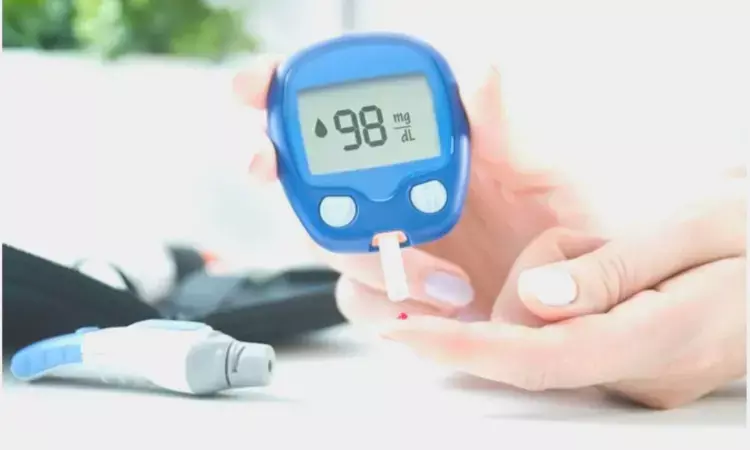- Home
- Medical news & Guidelines
- Anesthesiology
- Cardiology and CTVS
- Critical Care
- Dentistry
- Dermatology
- Diabetes and Endocrinology
- ENT
- Gastroenterology
- Medicine
- Nephrology
- Neurology
- Obstretics-Gynaecology
- Oncology
- Ophthalmology
- Orthopaedics
- Pediatrics-Neonatology
- Psychiatry
- Pulmonology
- Radiology
- Surgery
- Urology
- Laboratory Medicine
- Diet
- Nursing
- Paramedical
- Physiotherapy
- Health news
- Fact Check
- Bone Health Fact Check
- Brain Health Fact Check
- Cancer Related Fact Check
- Child Care Fact Check
- Dental and oral health fact check
- Diabetes and metabolic health fact check
- Diet and Nutrition Fact Check
- Eye and ENT Care Fact Check
- Fitness fact check
- Gut health fact check
- Heart health fact check
- Kidney health fact check
- Medical education fact check
- Men's health fact check
- Respiratory fact check
- Skin and hair care fact check
- Vaccine and Immunization fact check
- Women's health fact check
- AYUSH
- State News
- Andaman and Nicobar Islands
- Andhra Pradesh
- Arunachal Pradesh
- Assam
- Bihar
- Chandigarh
- Chattisgarh
- Dadra and Nagar Haveli
- Daman and Diu
- Delhi
- Goa
- Gujarat
- Haryana
- Himachal Pradesh
- Jammu & Kashmir
- Jharkhand
- Karnataka
- Kerala
- Ladakh
- Lakshadweep
- Madhya Pradesh
- Maharashtra
- Manipur
- Meghalaya
- Mizoram
- Nagaland
- Odisha
- Puducherry
- Punjab
- Rajasthan
- Sikkim
- Tamil Nadu
- Telangana
- Tripura
- Uttar Pradesh
- Uttrakhand
- West Bengal
- Medical Education
- Industry
Paradox: Patients without diabetes have worse surgical outcomes than diabetics with same hyperglycemia levels, JAMA

USA: The researchers from the US, in a recent study published in JAMA Surgery, have provided insight into the paradoxical association between Hyperglycemia and surgical complications in diabetic and non-diabetic patients.
The results showed that patients without diabetes with frequent insulin use and near-universal blood glucose testing had worse outcomes than diabetes patients at similar hyperglycemia levels. Insulin was shown to lessen this effect, and broader use may improve outcomes.
"Because neither underuse of insulin nor diabetes misclassification was responsible for perioperative hyperglycemia, the likelihood of a biological mechanism can be considered," Judy Y. Chen, Department of Surgery, University of Washington, Seattle, and colleagues wrote in their study.
In conventional terms, surgical complications tied with perioperative Hyperglycemia are associated with diabetes. Still, prior cohort studies paradoxically have shown that people without diabetes are at a greater risk of complications at similar hyperglycemic levels versus diabetes patients.
The research team, therefore, aimed to describe the association between perioperative Hyperglycemia and complications from surgery in people without diabetes undergoing surgery who received routine insulin administration and blood glucose testing. The team also evaluated the potential correlation of perioperative Hyperglycemia.
The researchers conducted a retrospective cohort study of the National Surgical Quality Improvement Program. It included consecutive patients undergoing vascular, general, and gynecologic operations who were expected to have an admission of at least 48 hours. 140 mg/dL or higher blood sugar levels within 24 hours after surgery was considered Hyperglycemia. The association between Hyperglycemia and complications was assessed, stratified by severity of Hyperglycemia, and adjusted for diabetes status.
The primary outcomes were perioperative Hyperglycemia and postoperative complications, comparing patients with and without diabetes.
The study yielded the following findings:
· A total of 7634 patients (mean age, 53.5 years; 83.3% patients without diabetes and 17.7% patients with diabetes underwent general ([81.3%]), vascular [2.7%], and gynecologic [16%}) operations. Of these, 77% had blood glucose testing (73.5% individuals without diabetes and 99.9% with diabetes).
· Hyperglycemia occurred in 91% with diabetes and 50.7% of patients without diabetes. Of those with blood glucose levels of more than 180 mg/dL, 72.7% received insulin (91% of patients with diabetes who had Hyperglycemia and 61% of patients without diabetes who had Hyperglycemia).
· Adjusted odds of a complication were 83% higher for patients without compared to those with diabetes at a blood glucose level of 140 to 179 mg/dL (odds ratio, 1.83), 49% higher for the blood sugar level of 180 to 249 mg/dL (odds ratio, 1.49), and 88% higher for blood sugar level more than 250 mg/dL (odds ratio, 1.88).
· A similar trend was seen for serious complications. Insulin may reduce the association between Hyperglycemia and complications in patients without diabetes.
"These findings indicate the importance of continued perioperative glycemic monitoring, particularly in those patients without a known history of diabetes, and underscore areas for further inquiry," they conclude.
Reference:
Chen JY, Nassereldine H, Cook SB, Thornblade LW, Dellinger EP, Flum DR. Paradoxical Association of Hyperglycemia and Surgical Complications Among Patients With and Without Diabetes. JAMA Surg. 2022;157(9):765–770. doi:10.1001/jamasurg.2021.5561
Dr Kamal Kant Kohli-MBBS, DTCD- a chest specialist with more than 30 years of practice and a flair for writing clinical articles, Dr Kamal Kant Kohli joined Medical Dialogues as a Chief Editor of Medical News. Besides writing articles, as an editor, he proofreads and verifies all the medical content published on Medical Dialogues including those coming from journals, studies,medical conferences,guidelines etc. Email: drkohli@medicaldialogues.in. Contact no. 011-43720751


